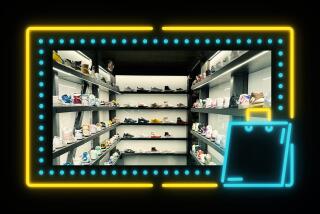RUSSIA : Traders’ Tiny Kiosks Hold Big Dreams
- Share via
MOSCOW — What stands smaller than a camping trailer, holds liquor, junk food and almost any other consumer item imaginable and embodies the hope of thousands of entrepreneurs in the former capital of the Communist world?
A kiosk.
Made of wood, corrugated metal, plate glass and steel bars, these tiny shoots of grass-roots capitalism create virtual strip malls outside subway stations, along all main streets and at every busy intersection in Moscow.
Thousands of these mini-shops have sprung up here since early this year, when President Boris N. Yeltsin, in a step to enliven the consumer market, decreed that individuals and organizations have the right to buy and sell goods almost anywhere.
Now, practically anything can be found in these flimsy retail outlets. Religious medals dangle incongruously above sex toys. Silk clothing and down coats from China, small appliances and tear-gas canisters are displayed alongside cosmetics, videotapes and--most plentiful of all--cigarettes and liquor. Although the goods are of variable quality and the prices relatively high, kiosks have revolutionalized the once-goods-starved marketplace in Moscow.
They are owned and run by enthusiastic, fledgling capitalists, many of whom abandoned dull, low-paying jobs at state-owned enterprises to try to make ends meet--or make their fortunes. Conservatives scoff at them as parasites taking advantage of the people during an economic crisis, but pro-market economists praise them as the hope for Russia’s future.
One such entrepreneur is 25-year-old Galina Konovalova, who together with two partners runs the most elaborate of the dozens of kiosks near the busy Sukharevskaya Metro Station on Moscow’s Garden Ring Road.
A shoe designer by training, Konovalova quit her job at a state-run factory because she was worried that her co-workers’ sloppy “Soviet” work habits would rub off on her.
When a friend suggested that she work at a kiosk for a while, Konovalova balked at first, fearing that such work would “destroy” her. Under the Soviet system, any private buying and selling was stigmatized as dirty, socially unacceptable business, and entrepreneurs were forced to stay underground. But then she decided she could use the money.
Soon her manager, even some of her customers, began commenting on her sales talents; she took on more responsibilities--did her own accounting and advised her manager on what items to stock--and she realized she actually liked her job. Then she and a couple of industrious friends decided to strike out on their own.
“Retail trade--if it’s intelligent and honest--is creative, exciting work,” she said. “I can give birth to ideas and see them through to reality. The measure of freedom that we enjoy gives us great satisfaction.”
Konovalova and her colleagues have big plans--first to expand to other kiosks and then, when they have saved enough money, to rent part of a factory and start manufacturing shoes or other consumer goods.
“We’re three energetic young people with lots of ideas,” she said. “But we need to gather capital first.”
Being nascent capitalists in Russia has its price. Kiosk managers must pay racketeers for protection from the Mafia-type groups that prey on private businesses here.
“It’s kind of like an insurance policy,” said Alexander Nikiforov, Konovalova’s 23-year-old partner.
A manager of a nearby kiosk, Valery Kulinkov, 30, said the so-called racketeers are not nearly as bad as one might think. “They’re not racketeers in the nasty sense,” Kulinkov said. “They work like watchmen and also bring us goods to sell.”
The real villain for kiosk owners, he said, lies elsewhere. “The city government is starting to strangle us,” he said.
In addition to one-time charges for registering kiosks and monthly fees for the space on the sidewalk and the right to sell, the city government is considering a tax on profits at kiosks, according to Vasily N. Doroshin, deputy minister of retail trade for the city.
Gennady S. Lisichkin, a pro-market economist, said kiosks play the important role of “socially rehabilitating” the private retail trade. The free-market partisans of Russia “are battling against the remnants of the Soviet system and pushing Russia toward a market economy,” he said.
More to Read
Sign up for Essential California
The most important California stories and recommendations in your inbox every morning.
You may occasionally receive promotional content from the Los Angeles Times.













